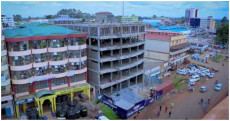- Historically, many Africans have relied on their siblings and loved ones for support and financial assistance. Unfortunately, this reliance has sometimes resulted in a single sibling bearing the weight of supporting not just their own family, but the broader community as well.
Africans take immense pride in their tribal backgrounds, whether residing on the continent or in foreign lands. This connection fosters a strong sense of identity and belonging, particularly in rural communities where the home is open to all.
Historically, many Africans have relied on their siblings and loved ones for support and financial assistance. Unfortunately, this reliance has sometimes resulted in a single sibling bearing the weight of supporting not just their own family, but the broader community as well.
In many villages, you might encounter families where this dynamic is prevalent, often stemming from traditional beliefs that encourage having numerous children—especially sons—to uphold the family name.
In these families, one or more children may achieve success in adulthood and take steps to improve living conditions for everyone. They ensure their family is fed, housed, and cared for while also managing their own household. However, this situation can become dire when siblings become indifferent, failing to contribute and leaving one person to shoulder the financial burden, often accompanied by loans and excessive work hours.
When the injustice of this situation is called out, the community may push back against the individual raising the concern.
It is troubling that one person must toil day and night to support fully grown adults who do not lift a finger to help in times of need. It may be time for a change: why should one individual carry the responsibility of caring for “mature” adults and their children? Shouldn’t these adults learn to support themselves instead of placing their burdens on already stressed siblings?
Perhaps it’s time for a cultural shift in understanding that having children is not an obligation. Each person should recognize that their responsibilities are their own and should not be foisted onto their siblings.
The overworked African son or daughter deserves to breathe. It’s time to establish consequences and encourage the community to listen to those who are overwhelmed. We must cut the chains that bind them. I hope our generation can break this cycle, fostering an environment where everyone supports one another, rather than leaving the weight of responsibility on just one person.












